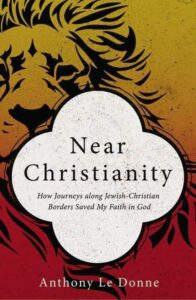 Today’s post is an interview with Anthony Le Donne about his new book Near Christianity: How Journeys along Jewish-Christian Borders Saved My Faith in God
Today’s post is an interview with Anthony Le Donne about his new book Near Christianity: How Journeys along Jewish-Christian Borders Saved My Faith in God.
Le Donne (PhD, Durham) is Associate Professor of New Testament at United Theological Seminary. He is also the author/editor of seven books including Historical Jesus: What Can We Know and How Can We Know It? and The Wife of Jesus: Ancient Texts and Modern Scandals
. He is the co-founder of the Jewish-Christian Dialogue and Sacred Texts Consultation at the Society for Biblical Literature and the executive editor of the Journal for the Study of the Historical Jesus.
What is the book about? Give us the book’s elevator pitch.
It’s about viewing Christianity from a healthy distance and in conversation with my Jewish friends and mentors.Near Christianity is an obvious play on Lewis’s famous apologetic, Mere Christianity. My book is different from his, however, in terms of scope and audience. Lewis wrote that he wanted to distil Christianity to its “thinnest” elements. He also said that his book was for “unbelieving neighbours.”
I’ve read a number of books like this that try to reduce Christianity to its essential beliefs or highest aspirations. This way of studying Christianity isn’t necessarily faulty. You can learn some interesting things about a people by examining their idealized center. But my book suggests that you can learn even more about a people by talking to their neighbors. So I start by viewing Christianity from its historic borders.Also, my book isn’t about what I can teach “unbelievers” about the essence of Christianity.
My book is written for my fellow believers about what I’ve learned from thoughtful and sympathetic voices beyond the borders of Christian belief.
Why did you write Near Christianity? Why were you curious about this idea.
Near Christianity is more personal than anything I’ve published before. I reveal more of my private interests and reflections than any of my publications, or anything I cover on my blog. So much of my academic writing is a struggle to bracket out my defaults and cultural assumptions. I’m often trying (and failing) to take “me” out of my research. I think that I needed a project that allowed me to be invested in a more intimate way.
So this book reveals a couple things about me: (1) I’m fascinated by the borders of Christianity. What sort of fences and fault lines have Christians created? Which borders do we trespass most often and most unwittingly? And what do our neighbors know about us that we don’t know about ourselves?
(2) I realized somewhere along the way that my experience of God’s silence has shaped me profoundly. This is something that most Christians don’t talk about. Maybe they’re ashamed to admit it or they worry about what their coreligionists will think of them. But I think there are millions of us who quietly live our lives without any sense of divine intervention. In any case, I found myself reading Jewish authors on this subject and finding camaraderie with Jewish friends. I really didn’t go looking for this topic, it just became part of my daily life.
Holocaust theology is a prominent thread in the book, so “excited” may not be the right word. It runs from early Christian heresy hunting, to medieval notions of pilgrimage, to modern political rhetoric. It looms large in modern Jewish-Christian relations but most Christians are oblivious to its importance. Do a google search of “Holocaust Theology” and look for the Christians voices in the conversation. They are few, far between, and (mostly) dated. My book tries to engage this conversation and work out the implications of it for Christians. I wouldn’t say that Near Christianity is a Holocaust theology per se, but it does reflect on a few key voices.
On a more positive note, I play with differences between tolerance and love. The concept of love is essential to both Jewish and Christian identity. I put Aristotle, Shelley, C. S. Lewis, Michael Wyschogrod, Jon Levenson and a few others at the same table. In many ways, modern Western culture is preoccupied with love. But we’re really not equipped to understand how ancient peoples thought about it and lived it.
When I started writing I had no idea that I’d write a chapter on the forms and functions of humor. At about the time I started writing, a Pew Research Center conducted a massive survey of American Jews about what it means to be Jewish. It turns out that 42% of those surveyed said having a “good sense of humor” is crucial. I was floored by this. Just to give you a point of reference, keeping kosher got a response of under 20%. This got me thinking about how important humor is to my life as a Christian.
I never read a treatise on humor in theological textbook or saw the topic in a seminary faith statement. Even so, every close friendship I’ve ever had—those closest to me, those who were most beneficial to my faith—these were people who connected with me in laughter. So I was determined to learn more about how humor, comedy, and laughter enhanced relationships of faith. I ended up leaning heavily on a philosopher named Ted Cohen who argues that joke telling is a way to initiate and maintain intimacy. I came to the conclusion that intimacy created by laughter is an important theological topic.
You, Pete. Just you. I kept a poster-sized print of your senior picture above my mantle and gazed at it whenever I needed  guidance. . . .
guidance. . . .
But, of course, the official answer to your question is that this book is written for Christians who want to learn a something new about Christianity. Becoming self aware, in large part, is about becoming a good listener. Constructive criticism and appreciation from a neighbor who knows you well can be enlightening. I truly believe that this process is essential to becoming a better Christian.
Near Christianity is for any disciple of Jesus who cares enough about their faith to examine it critically.
